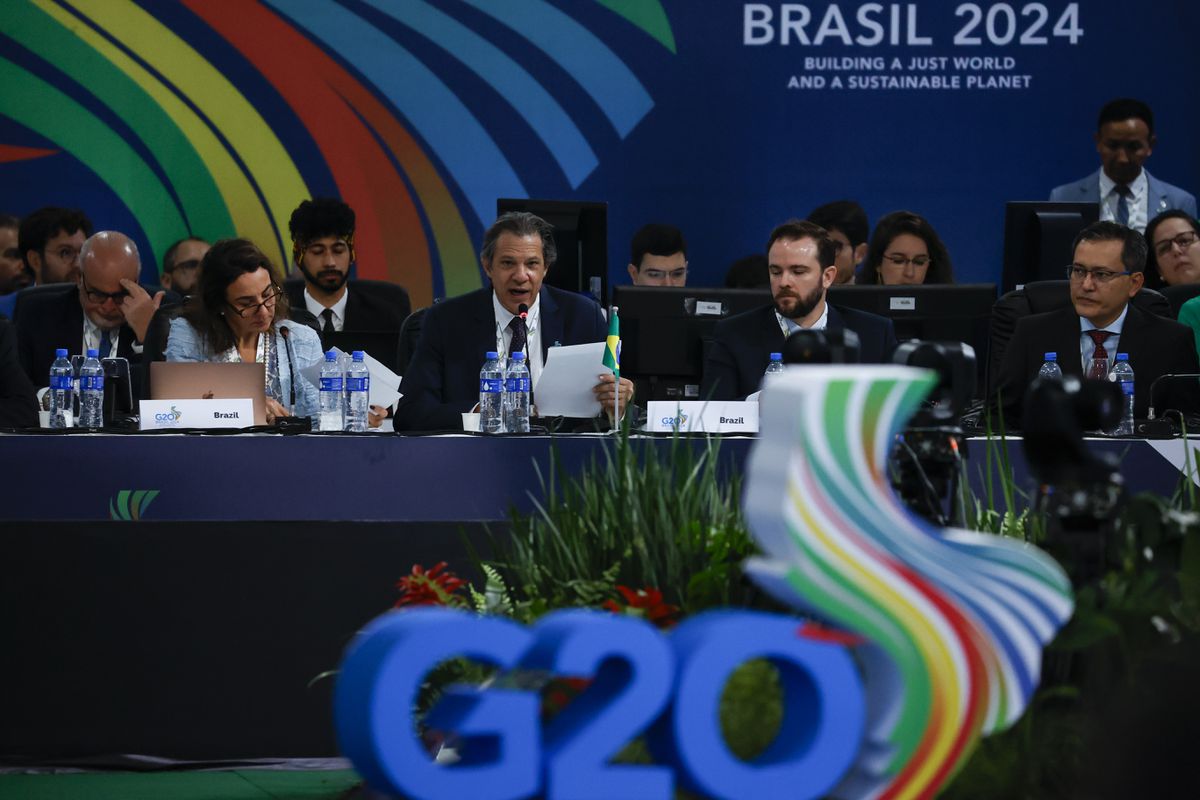Brazil wants the world's largest economies to agree so that the richest pay more taxes.
The country, which chairs the G-20 this year, has put the fight against inequality at the center of the group's debates, and taxes on billionaires were going to be the star proposal of the meeting of Economy Ministers that was held this year. week in São Paulo.
Taking stock this Thursday, the host, the Brazilian minister of the field, Fernando Haddad, described the meeting as a success, although he admitted that “geopolitical differences” and the different visions about what is happening in Ukraine and the Gaza Strip prevented release a joint statement.
The meeting ended with a summary text released by the Brazilian presidency that ensures that the countries agreed to "continue promoting global dialogue on fair and progressive taxation."
Despite the lukewarmness of this declaration of intentions, Brazil celebrates having placed the issue on the agenda, although the words of the representative of the Government of Luiz Inácio Lula da Silva at the beginning of the meeting indicate that he expected a little more ambition.
He cited data from the EU Tax Observatory, which in a recent report noted that billionaires (those with $1 billion or more) pay in taxes at most between zero and 0.5% of their wealth.
“Colleagues, I sincerely wonder how we allow a situation like that to continue,” he said in his speech at the start of the session.
In Brazil, France, Italy, the United Kingdom and the United States, the super-rich pay proportionally less taxes than the average worker, according to an Oxfam report published this week in the heat of the meeting.
The organization estimates that if a 5% rate were applied to the wealth of G-20 billionaires and billionaires, up to $1.5 trillion a year could be raised, enough to end world hunger and help for developing countries to adapt to the impacts of climate change.
In the debates in São Paulo, the ministers did not go into specifics, although they did listen to one of the gurus on the matter, the French economist Gabriel Zucman, who advises the Brazilian Government when preparing proposals.
In his opinion, a tax of at least 2% on the fortunes of billionaires (which would affect some 3,000 people worldwide) would already be a good start.
Zucman assured at a press conference that the idea was received positively, especially by the United States and France.
Aware that tax havens still have a long life ahead of them and that it is very difficult to achieve a planetary consensus that prevents the richest from moving their money as they see fit, Zucman asked to avoid defeatism: “It is utopian to think that we will have an agreement with total consensus, but it is important to understand that we do not need a global consensus, there can be progress with a critical mass of countries that want to go in that direction,” he stated.
He gave as an example the agreement reached in 2021 by 136 countries to apply a global minimum tax of 15% to large multinationals.
Regarding taxes on billionaires, the Brazilian Government hopes to have a concrete proposal at another meeting of Economy Ministers to be held in July.
According to the statement that Brazil released at the end of the two-day meeting, the ministers exchanged views “on ongoing wars, conflicts and humanitarian crises, highlighting Ukraine and Gaza.”
The Brazilian presidency pointed out that the meeting “is not the most appropriate forum to resolve geopolitical issues.”
The German Minister of Finance, Christian Lindner, stated in a press conference that he would only have communicated jointly if these conflicts were put at the center.
Aside from the final differences, Ukraine was also especially present in the bilateral meetings and in the public statements of the authorities gathered in the Brazilian city.
US Treasury Secretary Janet Yellen defended confiscating Russian funds frozen in the world since the start of the war, valued at around $285 billion, and stated that the G7 countries agreed.
However, members of that group, such as Germany and France, distanced themselves from the proposal.
Brazil also made an effort to bring economic debates to the environmental field.
When he opened the first day of debates, the Brazilian minister recalled that the most privileged in the world not only pay less taxes than the rest, but they are also those who pollute the most.
The richest 1% have 43% of global financial assets and emit the same amount of carbon as the poorest two-thirds of humanity, he said.
“It is an unsustainable situation.”
Brazil took advantage of bilateral meetings to close an agreement with the Inter-American Development Bank (IDB) to protect green investments from exchange fluctuations.
The bank will also open a $2 billion line of credit for reforestation and low-carbon agriculture projects.
Ministerial meetings like this week's in São Paulo take place throughout the year.
The most important event will take place at the end of November, when the heads of state and government of the 20 richest countries in the world will meet in Rio de Janeiro, ending the Brazilian presidency of the group.
Follow all the information from El PAÍS América on
and
X
, or in our
weekly newsletter
.
Subscribe to continue reading
Read without limits
Keep reading
I am already a subscriber
_

